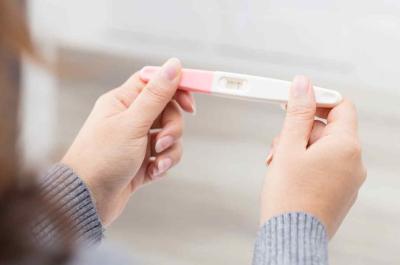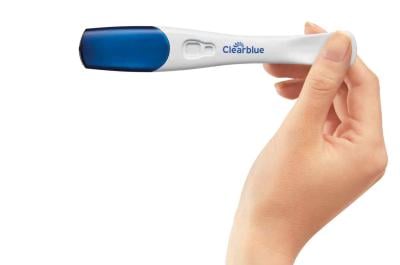If you think you might be pregnant, you want to know right away. But it’s important to understand what’s happening in your body so you know how soon you can test.
Read on to learn all about when to use a pregnancy test, the types of tests available and more!
Calculate when I can test.
First day you can test
Your personal cycle information
| Start of your last period | |
| Positive ovulation test date | |
| Usually, how long is your cycle? | days |
This tool is for guidance purposes. Always use the leaflet provided with your product to work out when you can test.
When to take a pregnancy test.
After the egg is fertilized, it travels to the uterus (womb) and begins to implant in the uterine wall. If implantation is successful, tiny amounts of the pregnancy hormone, hCG, can start to appear in your urine from around 7 – 9 days after ovulation. It is this hormone that all home pregnancy tests detect. Some early pregnancy tests, such as the Clearblue Early Detection Pregnancy Test, can tell you whether you are pregnant as early as 6 days before your missed period (5 days before you expect your period)1.
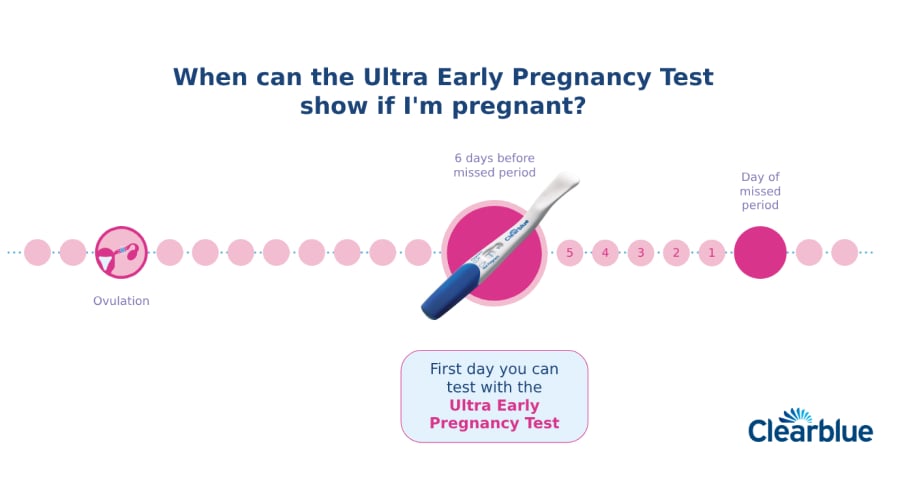
No matter when you test, you can be confident in the accuracy of a “Pregnant” result with any Clearblue Pregnancy Test.
But if you are testing early, before your period is due, you should be aware that even if your result is not pregnant, you may still be pregnant. This is because human Chorionic Gonadotropin (hCG) levels vary from woman to woman, and there may not yet be enough of the hormone for the test to give a positive result. HCG levels rise rapidly in early pregnancy, as shown in the graph below, meaning that if you test again on the day you expect your period, your result (whether positive or negative) will be over 99% accurate.
Rise of pregnancy hormone
(hCG) in early pregnancy
concentration
period
period
The day of your expected period is the day your period is due to start. If you still haven’t got your period the next day, this is the first day of your “missed period”. If you see instructions in the leaflet telling you, you can take a test as early as four days before your expected period, this is the same as five days before your missed period.
You can use the calculator below to check when you can take a pregnancy test. Most women have menstrual cycles that vary in length from cycle to cycle, which is perfectly normal. If your cycles tend to vary, you should use the longest cycle you’ve had in the last 6 months, in the calculator below.
All you need to know about testing early for pregnancy.
How pregnancy tests work
Home pregnancy tests use antibodies to detect the presence of the hormone human Chorionic Gonadotropin (hCG) in your urine. The most sensitive home pregnancy tests, such as Clearblue Early Detection, can detect hCG as early as 6 days before your missed period1
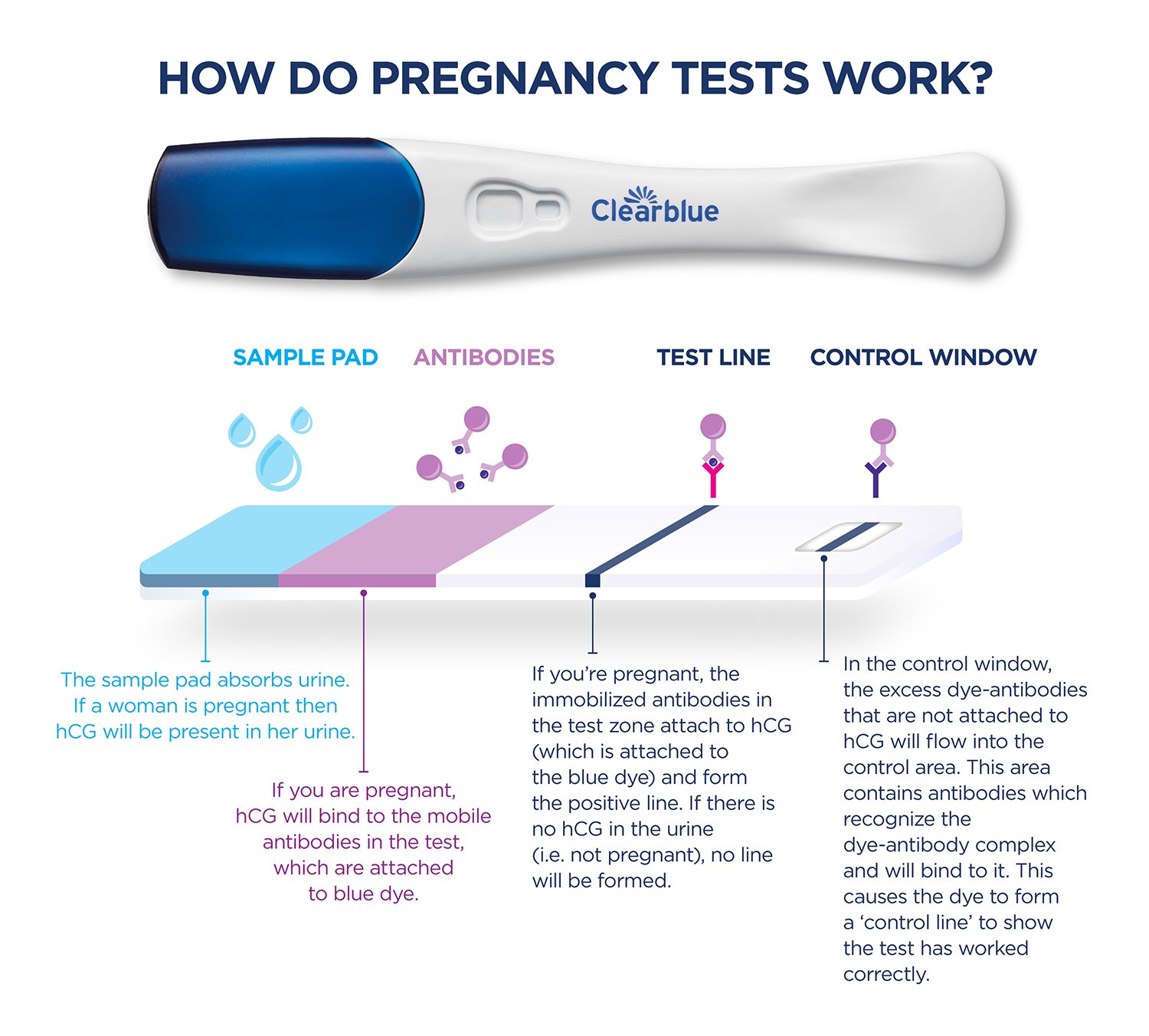
Even though hCG levels are very low at first, they increase rapidly in the first weeks of pregnancy.
If a pregnancy test detects hCG, your result will be positive and you can be confident that you are pregnant.
If the test is negative, but you tested before the day of your expected period, then there is the possibility you could still be pregnant but your hCG levels were too low for the test to detect. You should test again when your period is due.
If you get a negative result on or after the day you expect your period, but still think you might be pregnant, see your doctor.
So, how accurate are pregnancy tests?
All Clearblue home pregnancy tests are more than 99% accurate from the day you expect your period4.
What is the best time of the day to take a pregnancy test?
If you take a pregnancy test after you have missed your period, then you can test at any time of day as your hCG levels will be high enough to be detected by most home pregnancy tests.
- However, if you’re testing before you expect your period, when any hCG level would be much lower, you should test with the first urine of the day (when hCG levels are most concentrated) and avoiding drinking a lot of liquid (including water) before testing.
Also, make sure to use an “early test” if you are testing before you miss your period.
Which test is right for me?
You may feel overwhelmed by the number and types of pregnancy tests on the market. See our guide to Clearblue tests to find the right test for you:
- Easy, fast testing. If you’ve missed a period and just want to know whether or not you’re pregnant as fast as possible, then why not try the Clearblue Rapid Detection Pregnancy Test? You’ll see a plus “+” sign for “pregnant” as fast as 1 minute when testing from your missed period or a minus “-” for “not pregnant” in as little as 3 minutes, making the result easy to read.
- Early testing. If you want to know whether you are pregnant but don’t want to wait until you miss your period, you can use our Early Detection Pregnancy Test, which you can use from 6 days before your missed period1,3
- Digital testing. If, like many women, you want the confidence of an unmistakably clear “Pregnant” or “Not Pregnant” result in words, then our Pregnancy Test with Weeks Indicator could be a good option for you.
- Weeks Indicator. If you're curious to know how far along you are in your pregnancy, you can take our Pregnancy Test with Weeks Indicator, which also shows the weeks since conception as 1-2, 2-3 or 3+.
| Clearblue Pregnancy Tests and their features | Pregnancy Test with Weeks Indicator | Digital Ultra Early Pregnancy Test | Ultra Early Pregnancy Test | Rapid Detection Pregnancy Test |
| Over 99 % accurate4 | x | x | x | x |
| 6 days Early testing | x | x | ||
| Digital results in words | x | x | ||
| Unique stop light | x | |||
| Smart Countdown to result | x | |||
| Weeks Indicator | x | |||
| Result in 1-3 minutes | x |
FAQs about pregnancy tests
When can I take a pregnancy test?
It depends on the pregnancy test – some even let you test up to 6 days before your missed period.
Can you test too early for pregnancy?
Yes, if you test too long before your period is due, then the levels of hCG in your urine can be too low to be detected by the test, which could lead to a negative result even if you are pregnant.
Should the result be negative, but you still suspect you are pregnant, test again in a few days’ time, or when your period is due.
What are the signs that you should take a pregnancy test?
If you’ve had unprotected sex (especially around your fertile window) and you’ve missed your period, or you’ve noticed other early signs of pregnancy, you may want to take a test.
If you are worried you might be pregnant for any reason, it won’t hurt to take a test.
When it comes to taking a pregnancy test, all Clearblue tests are over 99% accurate at detecting pregnancy from the day you expect your period4. Some tests can also be used as early as 6 days before your expected period.
Just find the right home pregnancy test for you and your needs, and make sure you follow the instructions carefully.
- Provides early detection of the pregnancy hormone.
71% of pregnancies can be detected 6 days before the missed period (5 days before the expected period). - https://www.ncbi.nlm.nih.gov/pmc/articles/PMC4119102/
- Over 99% accurate at detecting pregnancy from the day of an expected period.
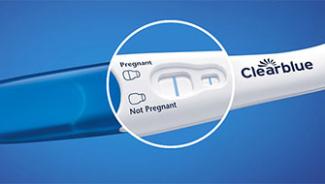
Results 6 days before your missed period
When you want to know if you’re pregnant waiting to test can be hard. That’s why Clearblue Ultra Early Pregnancy Test can be used up to 6 days before your missed period, which is 5 days before you expect your period to start.
79% of pregnant results can be detected 6 days before your missed period.

How to use a pregnancy test
When and how you can test depends on the test you use, but in this article you will find everything you need to know before starting a test.


